A new report from Britain’s National Audit Office has found that the cost of new forms of asylum accommodation on 'large sites' has actually increased government spending by as much as 46 million pounds, compared to the spending on hotels.
A report released on March 20 by Britain’s National Audit Office (NAO), the UK’s independent public spending watchdog, found that the government is spending more on alternative accommodation for asylum seekers like barges than on the hotels it had sought to replace.
That is even though the last three Home Secretaries (Interior Ministers) Priti Patel, Suella Braverman and the current incumbent James Cleverly have all highlighted how costly housing asylum seekers in hotel accommodation has become. At one point, in 2023, the UK government claimed it was spending up to 8 million pounds per day on contracts with hotels.
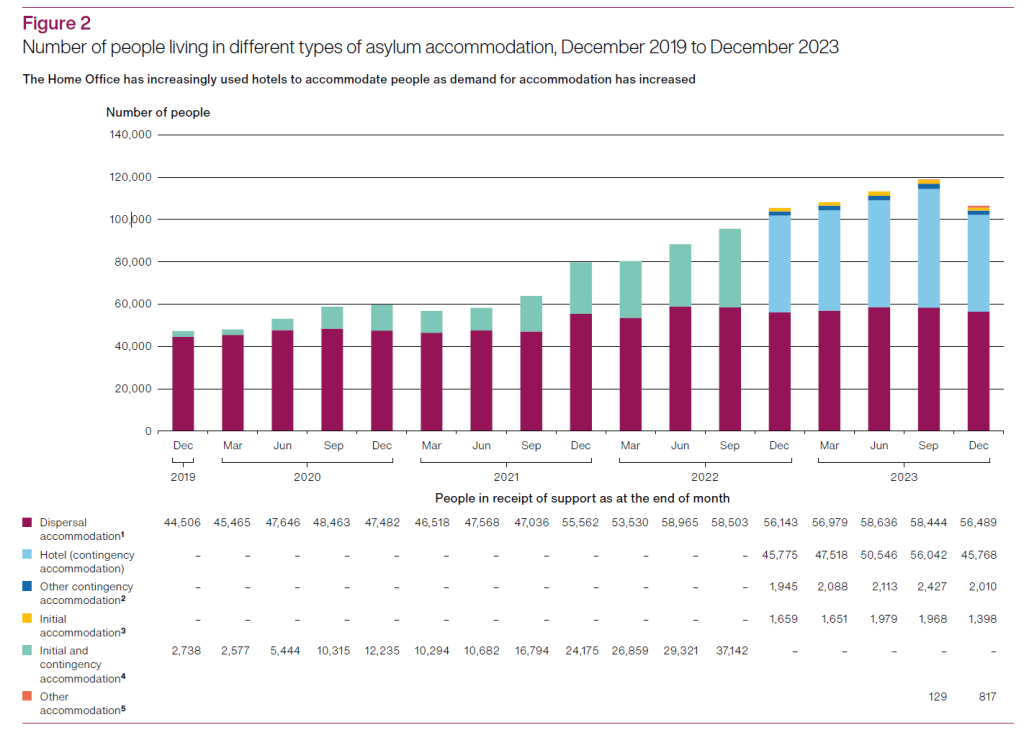
Prime Minister Rishi Sunak told the right-wing news channel GB News in August last year that he wanted to put an end to those "wrong [and] unfair" costs and that the government was exploring "alternative sites like barges."
Sunak championed his approach as innovative and new and promised voters that the policies would help "stop the boats," coming across the Channel, one of his key five pledges since becoming Prime Minister.
Before embarking on its plans, the government believed the large sites would offer value for money and would be around 94 million pounds cheaper than using hotels.
Bibby Stockholm
In fact, only one barge is actually in operation as asylum seeker accommodation -- the Bibby Stockholm. The barge was initially promised to be functioning in late-spring, early summer 2023, but eventually welcomed just a few asylum seekers on board in August, before having to be evacuated almost immediately, due to reports of a bacterial outbreak and safety concerns.
Also read: Barges and cruise ships, are they suitable housing for asylum seekers?
In autumn 2023, the barge was finally declared open for business but has been dogged by protests, both by those who don't want asylum seekers in their local area, as well as from organizations that accuse the government of keeping people who have not been found to have committed a crime in a state of semi-detention in a port with a high-level of security.
In December 2023, reports of the death of a young Albanian asylum seeker on board led to more calls to investigate the effect this type of accommodation is having on the mental health of those on board.
A similar fate has befallen several of the proposed military sites. Many of the proposed sites have not yet been fully opened and have been the subject of intense campaigns by local residents who are unhappy about seeing a concentration of single, male asylum seekers pitch up in their local rural area.
The 'facts' of asylum in the UK
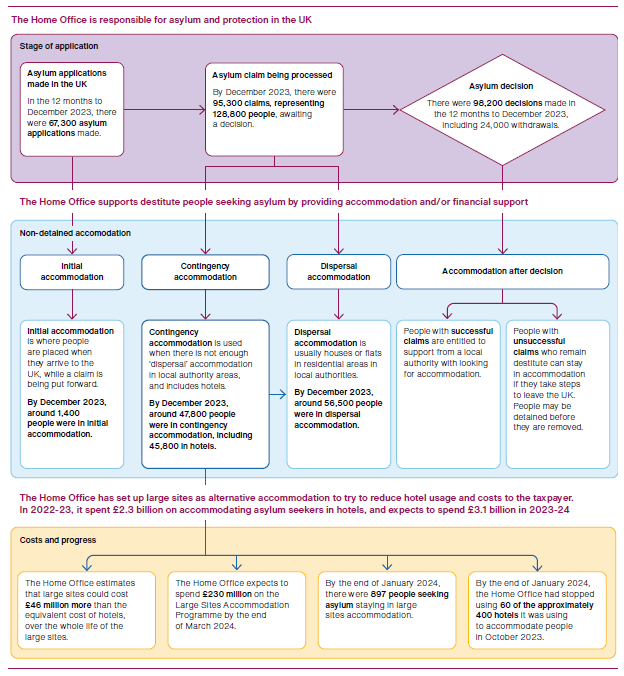
The NAO’s latest report was begun, states the organization, "in response to public and parliamentary concerns about the Home Office’s plans to accommodate people seeking asylum."
NAO writes that "we set out the facts about the Home Office’s plans and actions to reduce the use of hotels and the costs to the taxpayer." The report mostly concentrates on these "large sites" like barges or airbases, but government plans to increase the number of people sharing rooms and so-called "dispersal accommodation" were also examined, writes NAO.
'Too fast'
The report finds that the Home Office has made progress in its plan to reduce the use of hotels to accommodate people seeking asylum. But "in rapidly progressing its plans to establish large sites, it has incurred nugatory [useless, futile, of no value or importance] spending and increased risk."
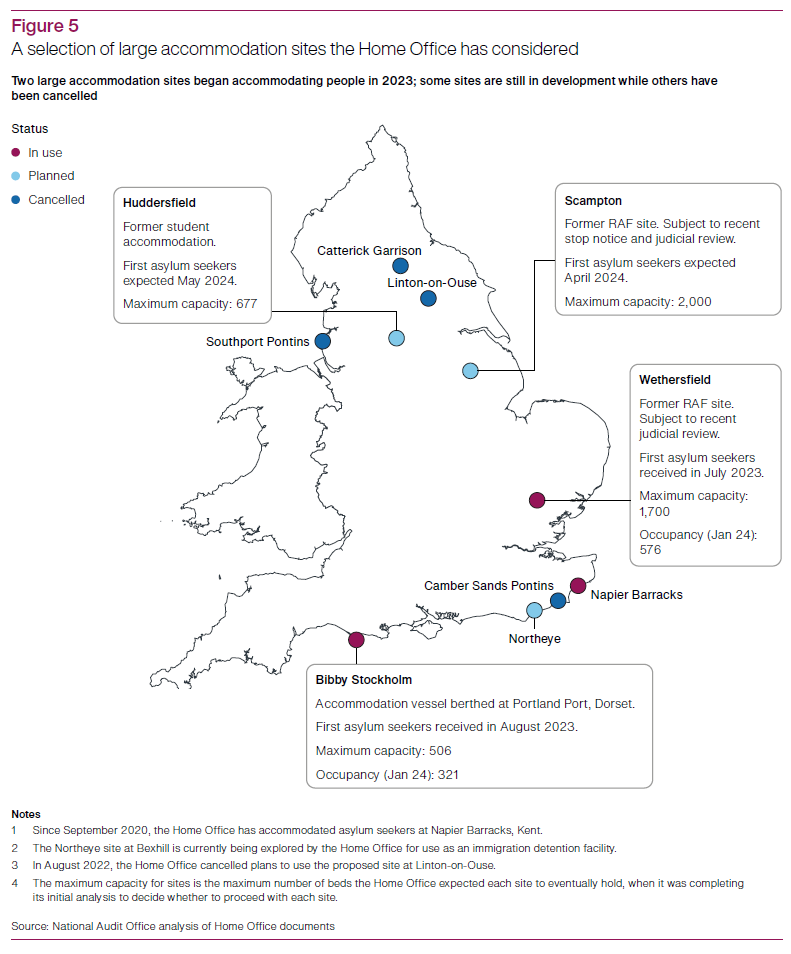
Also read: HRW says asylum seekers in UK face 'dire conditions'
According to the report, the site planned at RAF Scampton is "yet to open" and accommodation on an airbase in Wethersfield and aboard the Bibby Stockholm barge "are accommodating far fewer people than originally planned."
That is why, finds the report, "collectively these early sites will now cost more than the alternative of using hotels." According to figures provided by the Home Office for the audit, the government has estimated the costs of the large sites program at 1.2 billion pounds.
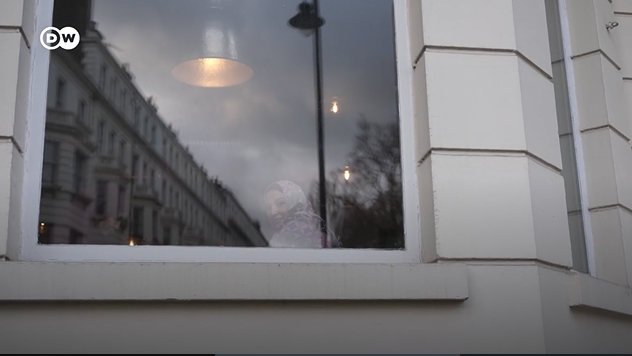
By the end of January 2024, the government had stopped using 60 hotels it had previously used to accommodate asylum seekers. It says the government "has managed to move out of these hotels because it increased the amount of room-sharing in hotels, increased the number of asylum decisions it is making, slightly increased the amount of dispersal accommodation, and moved some people into its new large sites."
Fewer people than expected accommodated on sites
The four 'large sites' in question are the Bibby Stockholm barge, former RAF bases at Scampton, which is not yet open, and Wethersfield, which is but is not at full capacity, and former student accommodation in Huddersfield.
By the end of January 2024, there were just 900 people registered as living on the various large sites which have opened. The accommodation at the four large sites "is expected to cost 230 million pounds by the end of March 2024," according to the NAO report.
At the end of January 2024, 321 single males were on board the Bibby Stockholm but the government had hoped to have 430 on that barge.
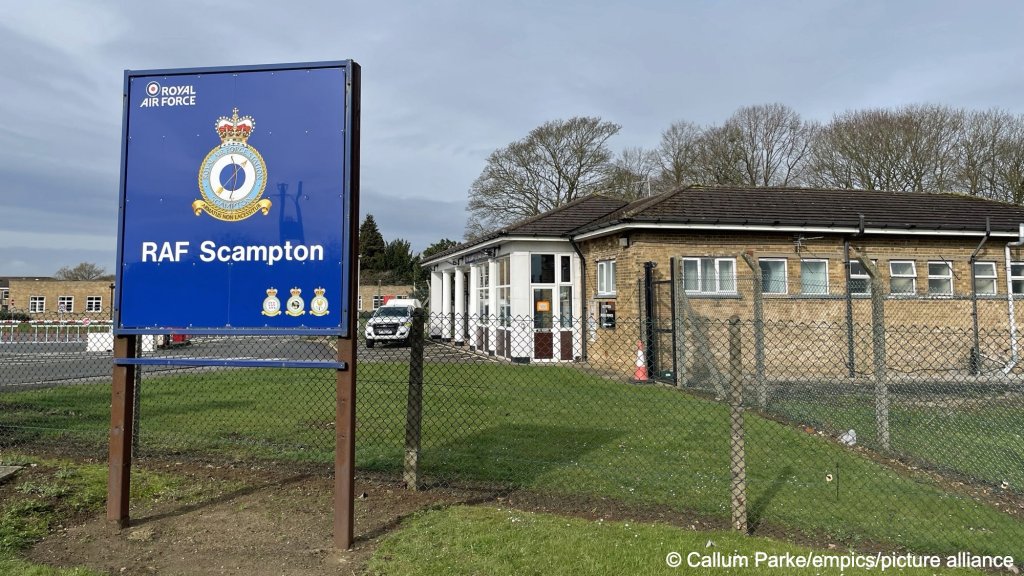
At the former RAF base in Wethersfield in Essex, in the east of England, there were 576 single adult males, but the Home Office had hoped that the site could accommodate 1,445. The Home Office says it hopes to move people onto the former RAF base in Scampton in Lincolnshire and into the former student accommodation in Huddersfield in Yorkshire, by April and May 2024 respectively.
Also read: UK government aims to cut legal migration
Before embarking on its plans, the government believed the large sites would offer value for money and would be around 94 million pounds cheaper than using hotels. However "its latest estimate suggests they will cost 46 million pounds more than using hotels," writes NAO. Even so, the Home Secretary James Cleverly has stated that he believes using these types of sites offer a more "appropriate and sustainable" level of accommodation.
'Unachievable'
The NAO points out that costs to set up the sites have seriously increased. From 5 million pounds per former RAF base to 49 million pounds for Wethersfield and 27 million pounds for Scampton. The second problem with the new accommodation types is that Wethersfield and the Bibby Stockholm are "housing just under half the number of people the Home Office expected them to at the end of January."
Since 2022, notes the NAO report, "the Infrastructure and Projects Authority has undertaken three reviews of the Home Office’s work on asylum accommodation…all are red-rated." This, explains the report, means that "successful delivery of the program to time, cost and quality appears to be unachievable."
The Home Office itself has reportedly recognized its own targets are unachievable and has "repeatedly revised accommodation targets downwards."
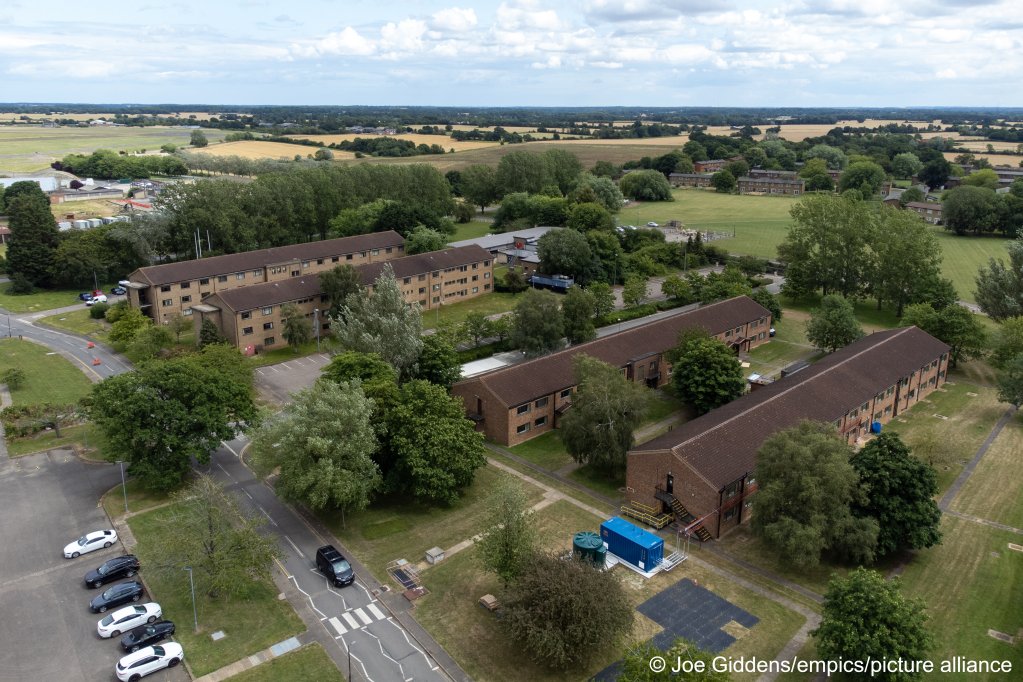
An absence of 'fully-competitive tenders'
The NAO report found that the Home Office had set "overly ambitious accommodation timetables" which led to "increased procurement risks." They also accused the Home Office of having "prioritized contracts quickly and modified existing contracts over fully-competitive tenders."
Because of the speed, the Home Office deployed emergency planning regulations to enable it to start work at the sites quickly, but had failed to communicate with local stakeholders about its plans, which says the report, might have reduced the risk of local opposition affecting negotiations to open the sites fully. The report found the government had "incurred losses of at least 3.4 million pounds developing sites it will not use."
For instance, found the report, between 2022 and 2023, "the government spent 2.9 million pounds preparing the former RAF base in Linton-on-Ouse to accommodate people, but later canceled its plans for the site."
It also paid around half a million to reserve vessels and barges it had hoped would provide additional asylum seeker accommodation but after announcing the Bibby Stockholm, could not secure a suitable port in which to dock the vessel.
In January 2024, notes the report, the Home Office "was still working with providers to develop specific measures assessing residents’ safety at large sites."
Recommendations
The NAO points out that the Home Office’s estimates of costs "contain significant uncertainty and are sensitive to its assumptions." For instance, the Home Office calculated that large sites would be more economically beneficial based on an assumption that hotel costs would rise to approximately £143 per person per night (excluding VAT). However, by January 2024, the government had estimated that even as little as a £10 fluctuation in price "could change the savings from large sites relative to hotels by approximately £60 million."
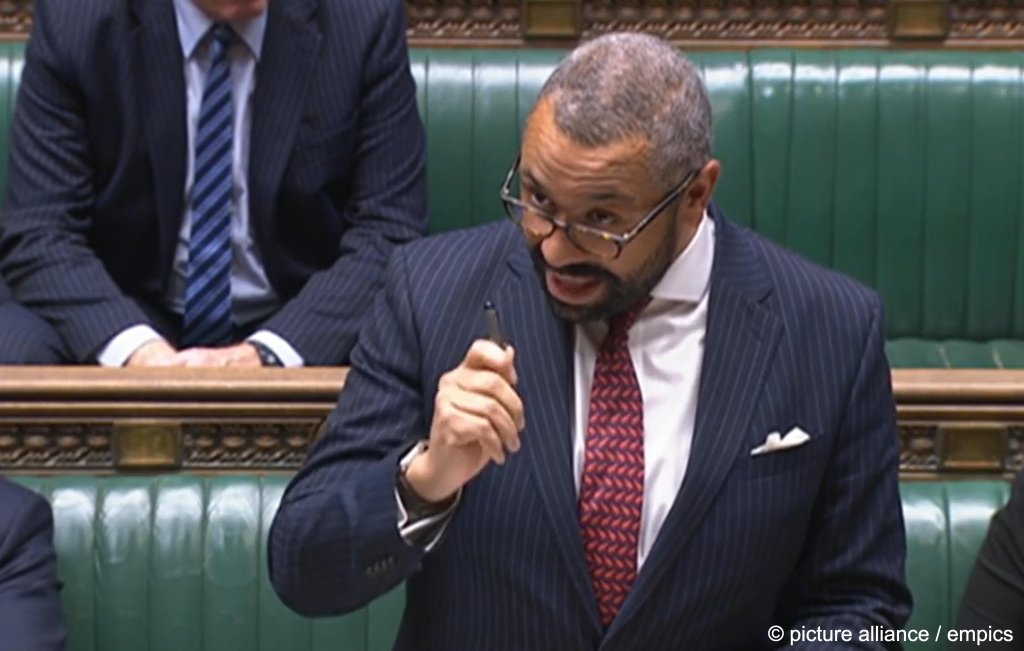
In fact, according to the NAO, the cost of hotels paid for by the government ranged from 127 pounds per person per night to 148 pounds between April 2023 and January 2024.
The report notes that the Home Office has now begun identifying smaller sites to accommodate between 200 and 700 people, as well as reducing the number of beds it places at some of the larger sites.
According to Gareth Davies, head of the NAO, the "Home Office continued this program despite repeated external and internal assessments that it could not be delivered as planned." Given "wider housing pressures" advised Davies, "The Home Office should reflect on lessons learned from establishing its large sites program at speed and improve coordination with central and local government."
Criticism and defense
Labour MP Meg Hillier, who chairs the House of Commons Public Accounts Committee, told the Guardian newspaper the government "must do better when it resets its program." Fellow Labour MP and shadow Home Secretary Yvette Cooper called the spending "staggering."
Cooper told the Guardian: "The British taxpayer is already paying out eye-watering sums on asylum hotels and now it turns out the sites they promised would save money are costing the taxpayer even more. Rishi Sunak has taken the Tories’ chaos and failure in the asylum system to a new level."
Cleverly and the Home Office provided a statement to the Guardian in defense of their actions and policies. A Home Office source was quoted as saying: "We have been clear these costs are too high and have answered the question Labour cannot, of where you can house asylum seekers when it is not possible to return them to their home country."
Also read: UK Refugee Council warns of high costs of new migration policy
The spokesperson added: "We acted swiftly to reduce the impact on local communities by moving asylum seekers on to barges and former military sites."
"While we must provide adequate accommodation for asylum seekers who would otherwise be destitute, thanks to the actions we have taken to maximise use of existing space and our work to cut small boat crossings by a third last year, the cost of hotels will fall – and we are now closing dozens of asylum hotels every month to return them to communities." The report notes the government intends to have closed a further 84 hotels by the end of April.
